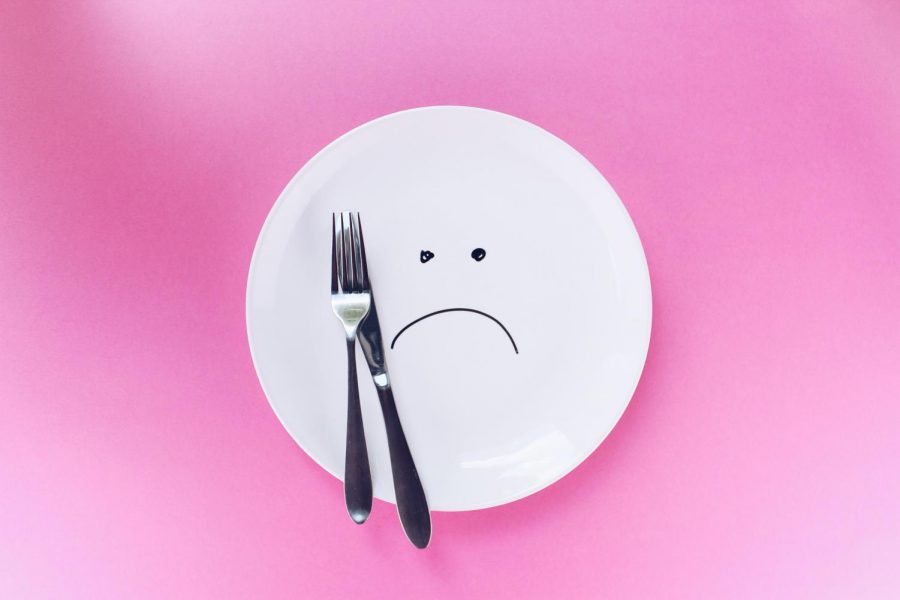Is Intuitive Eating the Answer to Living a Healthy Lifestyle?
People who practice intuitive eating often promote the ideal that one can be healthy no matter what size.
Dieting is common in teens. The National Center on Addiction and Substance Abuse reported that 58.6 percent of teen girls and 28.2 percent of teen boys are actively dieting. However, there’s a lot to be said for how well these diets work.
A study done by University of Minnesota found that dieting actually promotes weight gain and makes teens more likely to binge eat than those who don’t diet. All this research has ushered in a new health movement known as intuitive eating.
“[People] hope that [diets] are an easy fix, or a cure-all,” English teacher Mrs. Ciotti said. “[People] need that expertise to guide them through the process [of being healthy]; the diets offer structure and tools to assist them.”
To fully understand the concept of intuitive eating, it is first helpful to take a look at what is is. Certified intuitive eating counselor and psychotherapist Sarah Hersitch defines intuitive eating as, “a non-diet approach to help normalize your relationship with food.”
There are ten main principles behind intuitive eating that were developed by dietitians Evelyn Tribole and Elyse Resch. They include rejecting the diet mentality, respecting one’s fullness, and honoring one’s health. They are designed to break a person out of the realm of dieting and into the idea of eating according to their own body’s needs. This means no counting calories and macronutrients, and definitely no heavy monitoring of food intake.
“Intuitive eating is relearning how to eat without rules and rigidity, and instead, learn how to feel and honor your individual internal cues like hunger, fullness, cravings and satisfaction level,” Hersitch said. “[Intuitive eating] teaches us that the longer we fear fat, the longer we’ll stay steeped in dieting and ultimately feelings of not-enoughness.”
In 2018, the University of Helsinki did a study that followed the eating habits of young men and women. They found that the only people who succeeded in managing their weight long term were those who ate regularly without following any kind of diet. This style of weight management is the exact methodology behind the concepts of intuitive eating.
Ms. Hersitch describes intuitive eating as a way for people to end the “body project”: the never-ending quest to change their bodies to fit into the cultural thin-ideal. The idea that thinness isn’t innate or attainable for all people is another cornerstone of intuitive eating. This is often called Health At Every Size (HAES).
“I don’t think health is just about weight,” junior Emma Herceg said. “I think you have to mentally healthy… I think that if a person is comfortable with how they are, then they’re good.”
Because intuitive eating isn’t weight based, people who practice it often promote the ideal that one can be healthy no matter what size they are. According to Hersitch, body shape and size are not markers of health, and that health behaviors are more important. This would include eating the recommended amount of fruits and vegetables for your personal lifestyle, exercising frequently, and paying attention to fullness and hunger cues.
Ms. Hersitch believes intuitive eating to be an important practice because of all the damage that traditional dieting can do to a person’s body. She says that dieting has been shown to decrease self-esteem and increase depression and anxiety, and people can often get caught in cycles of dieting and depression. For 95 percent of people, she says that the desired weight loss never comes and is instead replaced with weight gain.
“So many people conflate health with body size… I encourage all people to consider, how do you want to feel mentally, emotionally and in your body? And, what behaviors can you engage in that will support that?,” Hersitch said. “This helps people move away from extremes of dieting and exercise and toward a sustainable approach that actually feels good for them and helps them achieve the way they want to feel.”
For those looking to engage in intuitive eating practices, she recommends first unfollowing any social media accounts that promote dieting, and instead following accounts that embrace body positivity and intuitive eating.
The most unique part of intuitive eating is that its principles apply to everyone. No matter your health concerns, it is possible to eat in an intuitive manner. Perhaps that is what makes intuitive eating so intriguing for many people: the idea of being free from dieting’s psychological constraints.
If you would like to learn more about intuitive eating, Hersitch encourages people to read “Intuitive Eating” by Elyse Resch and Evelyn Tribole. She also recommends the podcast “FoodPsych” by Christy Harrison, which can be found on iTunes. Seeing a nutritionist that specializes in intuitive eating is also an option for those wishing to speak to a professional.

Senior Sarah Jacobson is a third-year staff reporter, former Our World editor, and current Editor-in-Chief of the Spotlight. She is also the head of social...



